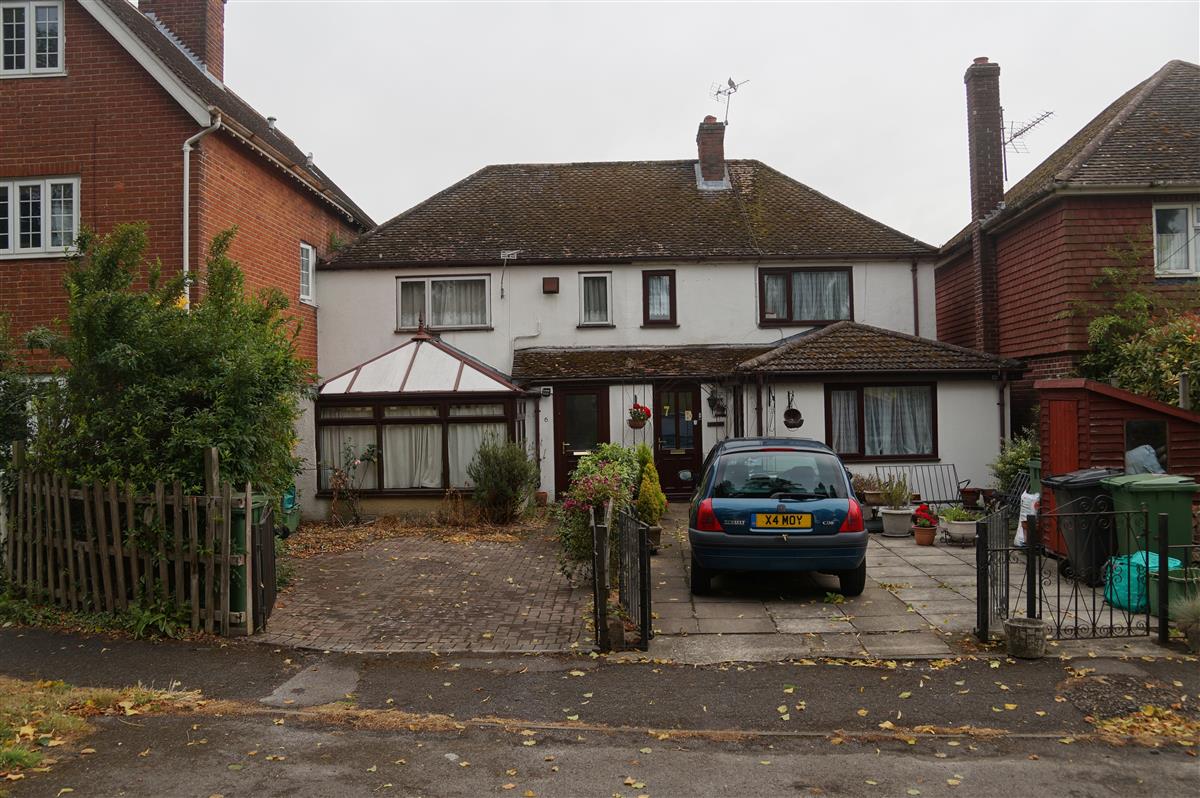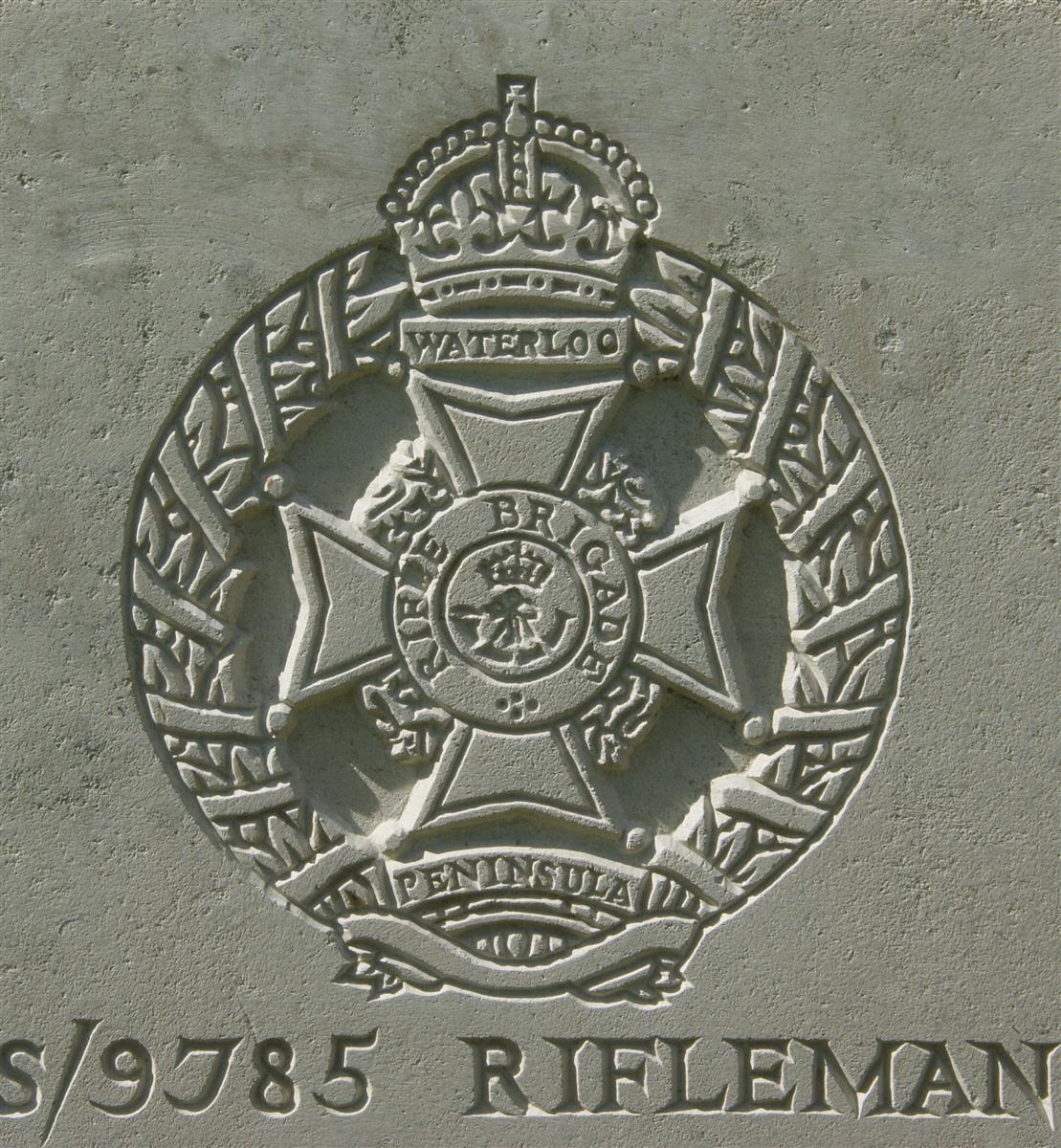Archibald John Hunter
Rifleman 1918 Archibald John Hunter, 4th Battalion, Rifle Brigade

6 &7 Stroud Green have replaced Hillman Cottages, the terrace of three cottages where the Hunters lived for many years. |
Archie was born in Crookham in 1890, the third child of Sarah Hunter née Durbridge. It is not exactly clear who his father was; Sarah’s first two children, Ellen (Helen) Elizabeth (born 1886) and William Alexander (1889) were born in Queensland, Australia and Sarah’s husband, William Irvine Hunter, was the registered father.
Sarah returned to England before Archie was born in the summer of 1890; while it is probable that William Hunter was the father there is no sign of his return to England, Sarah consistently gives her status as ‘married’ in her census returns and, in 1911, states that the marriage had lasted 25 years and resulted in six children - the last three being Ralph Stuart (1896), Dora Stewart (1898) and Alec Stuart (1902).
Making conclusions based on so little evidence is always dangerous, but the use of variations of the name Stuart as the middle name for the last three is suggestive of the practice of naming the father of illegitimate children in this manner. So appearances are that Archie was probably the son of William Hunter and that Sarah travelled to England while pregnant leaving an estranged husband in Queensland. Once settled in Newbury a partner surnamed Stuart entered the picture and the three younger children arrived. This conjecture is supported by a form filled in following Archie’s death which lists the younger siblings as being ‘of the half-blood.’ The same form notes that William Hunter was his father and was of ‘address unknown.’
When the family arrived in Newbury they lived at New Cottages, Crookham; on census night in 1891 Sarah, 2 year-old William and Archibald aged 10 months were lodgers at 4 New Cottages while 4 year-old Ellen was next door at No 3 with her grandmother, Jane Durbridge and uncle William Durbridge. By 1898 the family had settled at 3 Hillman’s Cottages on the north side of Stroud Green (now part of Newbury).

The regimental badge of the Rifle Brigade, as used on CWGC headstones. |
His seven years were up in January 1914 and the process of discharge to the Reserve commenced. As he was with the battalion in India at this time this was not a simple process, he would have to wait for a convenient time (convenient to the Army) to get transport home for final discharge. But war intervened while he was still in India and he was recalled to the colours before he had really left them. At the time he was with the 4th Battalion, Rifle Brigade stationed at Dagshai in the foothills of the Himalayas; it took some time to organise and transport the battalion back to the UK where it landed at Devonport on 18 November 1914. After a short period at Magdalen Hill Camp, Winchester, to integrate into the newly formed 80th Brigade and 27th Division the battalion landed at Le Havre, France on 21 December.
On 19 January he arrived back in England, hospitalised with frostbitten feet, first in a Birmingham hospital, then a convalescence home at Kineton. He was then fortunate enough to get a fortnight at home, probably the most his mother had seen of him for many years. However his recovery meant the inevitable return to France where he landed on 2 April.
During the 2nd Battle of Ypres the 4th Rifle Brigade had their first experience of poison gas on 25 and 26 April, which may be when Archie got a whiff of this awful new weapon. As infantry techniques developed soldiers were appointed to specialise in specific tasks; those with a good throwing arm were chosen as bombers, throwing bombs, known today as grenades. Archie evidently had such skills and was even used at night to penetrate no-man’s land to within range of the enemy and lob a few grenades in their direction – very dangerous work.
In late July or early August Archie would have heard the bad news of his elder brother, William’s death:
Newbury Weekly News, 12 August 1915 – Killed in Action
HUNTER – July 24, killed in action with the Expeditionary Force, France, Sergt W Hunter, 2nd Wilts Regt, late of Stroud Green, aged 27 years.
On 27 August his luck also ran out and he was killed, as reported in a letter from a comrade, by a shell which killed him instantly – it was rare indeed for such letters to give any hint of suffering, though many did, of course, suffer terribly before they died.
The battalion’s war diary adds very little to the story apart from a location:
War Diary, 4th Battalion Rifle Brigade – 23-27 August 1915
23rd Relieved KSLI in trenches Bois Grenier
25th In trenches - 2 killed, 8 wounded
26th In trenches - 1 wounded
27th In trenches - 1 killed, 3 wounded
Once again the news is imparted to the readers of the local paper:
Newbury Weekly News, 16 September 1915 – Killed in Action
HUNTER – Killed in action in France on August 27th, 1915, Rifleman Archibald Hunter, second son of Mrs S Hunter, of Stroud Green, Newbury, aged 25.
The paper had printed nothing more than the announcement when William died, but this time the family were more forthcoming and a lengthy report told the story of William, Archie and their brother Ralph:
Newbury Weekly News, 16 September 1915 – Local War Notes
Mrs S Hunter of Stroud Green, who has had the misfortune to lose her eldest son in the war, has now received the sad tidings of the death in action of her second son, Rifleman A Hunter, a strapping young fellow of twenty-five. Yet another son is engaged in the struggle for freedom, namely Gunner Ralph Hunter, RFA, as the appended military biographies indicate. Sergt William Hunter, or private as he was then, enlisted in the 2nd Wilts when only 16 years of age. He had seen seven years of military service when the European War broke out, five of which had been spent in India. In November 1914, he rejoined his old regiment, and a fortnight later left for France. He returned to Weymouth Hospital at Christmas with an injured foot, caused by an accident whilst loading ammunition. After a fortnight’s stay in hospital, he recovered sufficiently to return home, where he enjoyed three weeks rest.
Returning about the beginning of February to France, Sergt Hunter was quickly sent into the firing line. At the time of the struggle for Neuve Chappelle, he spent three long days and nights without quitting the trenches, and when he finally got away from the scene of action he was covered from head to foot with blood and mire. About the middle of June he received promotion to the rank of Sergt, and the next time news was received of him it was the fatal document saying he was killed in action on July 24th. An officer of his company, writing to Stroud Green, said that Sergt W Hunter was killed instantly, a shell bursting in the trench on Saturday afternoon, July 24th. He was much respected by his comrades, and was always willing to do his duty, however hard the task may have been.
Rifleman Archibald Hunter served for seven years in Cyprus, Egypt, India, and England, with the 4th Rifle Brigade previous to being recalled to the colours. He was out in India when war broke out, but returned immediately, arriving on the shores of his native country in November, 1914. He remained at Winchester until December 20th, then left for the front. At the end of January he was back in England again suffering from frost-bitten feet. With a week in hospital in Birmingham, a fortnight at Kineton, Warwickshire, and a fortnight at home, he returned to France via Winchester and Sheerness, crossing the channel on Good Friday. The Brigade were needed, so to the fore they went, and during this visit Rifleman Hunter experienced a taste of the German gas. Later he formed one of the noted 80th Infantry Brigade, 27th Division, who for holding a position for three weeks, received the compliments of Sir John French.
At this time he was constantly in the trenches, and later was appointed a bomb-thrower, his duty being to creep towards the German trenches in the depth of the night and hurl bombs into their midst – a dangerous and difficult task. On August 27th, however, his end came, a shell killing him instantly. A close chum of his wrote Mrs Hunter the day after his death, saying that he was just about to be laid to rest, and expressing the hope that he would himself be spared that he might visit his comrade’s grave daily. Gunner Ralph Hunter, the third son, enlisted on August 10th, 1914, at Newbury, being only just then turned eighteen. He volunteered for foreign service, and was sent to France in June last. A letter home received last Monday morning, stated that he is at present behind the firing zone, and faring well. Mrs Hunter has also a nephew, Signaller William Durbridge, in the Royal Berks, who left for the battlefield a month ago.

Archie's name on Newbury War Memorial. (middle - below his brother William) |
In the years following their deaths William and Archie were publicly remembered by their mother in the family announcements column of the local paper:
Newbury Weekly News, 26 July 1917 – In Memoriam
In loving memory of Sergt William Hunter, 2nd Wilts Regt, who was killed in action on July 24thy, 1915, Somewhere in France, also of Archie, brother of the above, who was killed in action on August 27th, 1915, of the 4th Rifle Brigade. “To memory ever dear.”
Newbury Weekly News, 25 July 1918 – In Memoriam
In loving memory of our darling boys, Sergt W Hunter, who was killed in action on July 24th, 1915; also of Archie, brother of the above, who was killed on the 27th August, 1915, in France. – To memory ever dear. From Mother and all at home.
For more information about Archie’s brothers please see William's story.

Find a memorial :
| Died this day: | |
| 02 March 1918 | |
| Edward Jones | |
| Pangbourne |

Like this site? Show your appreciation through a donation to a great charity.